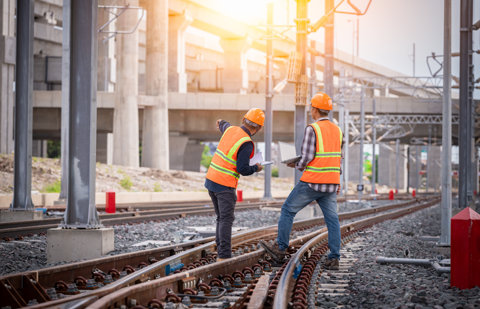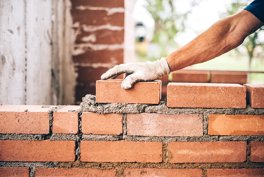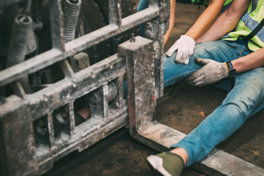
Matthew Trusch
Head of Personal Injury
If you’ve been injured in a railway accident that wasn’t your fault whilst working for a rail company or a contractor, you could be entitled to compensation.
The railway company or contractor you work for has a duty of care to protect you whilst you’re working for them. If they breach this duty of care and you get injured as a result, they could be held accountable for negligence, and you could be entitled to claim compensation.
If you’re a railway worker that’s been involved in an accident at work that wasn’t your fault, our team of specialist Accident at Work Solicitors are on hand to help secure compensation on a No-Win-No-Fee basis.
Fill in the form below to get in touch with one of our dedicated team members, or call our team today on: 0800 260 5010



Like with any profession, your employer is responsible for your health, safety and wellbeing whilst you’re under their care at work. Rail companies are no exception. They have a duty of care to make sure that the environment their employees are working in is safe.
This involves making sure that:

Often on any project work in the railway industry there are multiple contractors and sub-contractors involved who may all owe a duty of care to you. Accidents do commonly happen in the railway industry as a result of negligence of several different contractors involved in a project. We will work with you to quickly identify who all the potential parties are in your accident to ensure your claim is directed to the correct parties as quickly as possible.
If they fail in their duty of care and you get injured as a result, contact our team of Accident at Work Solicitors. If your injury was sustained within the last three years, we could help you secure the compensation you need to overcome your injury and recover any financial losses that you might have suffered following your accident.
At Simpson Millar we want to help you. We are proud of our track record and the comments from our clients which is at the end of the day why we do the work we do.
We have a strong track record of recovering significant amounts of compensation for our clients and are independently recognised as leaders in our field.
We will speak to you in plain English, not legal jargon, and keep you updated to make sure you know what is happening with your case. We can visit you at home or in hospital (in England or Wales) or talk on the phone or by video call – whatever works best for you.
Our award winning team includes nationally recognised personal injury claim experts, and we have members of the Association of Personal Injury Lawyers (APIL) as well as accredited Law Society solicitors.
We tailor our service to suit your specific needs. We deal with many claims for children working with their parent or guardian to complete the claim.
Although train crashes and derailments don’t happen that often, when they do, they usually result in serious, life-changing injuries or even death in some cases.
But regardless of where you work on the railway or what job you’re doing; railways are dangerous places to work. Aside from the big, catastrophic accidents, rail workers can also be exposed to all sorts of hazards if their railway employers and contractors don’t take the care to maintain a safe working environment for them: Accidents happen, and railway workers get injured more than you might think.
Here are a few examples of the types of accidents and injuries rail workers could claim compensation for:
We’ve seen so many train drivers suffer from serious brain and head injuries after being involved in serious crashes, derailments, or brake failure, usually because the machinery they were using was either faulty or not maintained properly, or because staff weren’t given adequate training to help them react in an emergency.
Some railway workers spend a significant amount of time around electrical power lines and hot metal surfaces particularly Overhead Linesmen and Track Workers. If their employers don’t have health and safety protocols in place to reduce their exposure to explosions, hose ruptures, engine fires and chemical solvent spillage, they could suffer from severe burns or electrocutions which can give them severe tissue damage or even result in cardiac arrest.
A lot of railway workers do a lot of heavy lifting and repetitive movements in their day-to-day jobs. If they’re not given adequate equipment or ergonomic solutions to help reduce the physical impact of this movement, it can lead to repetitive strain injuries, ligament and tendon damage, or long-term back, neck and joint problems.
Because railway yards are in constant motion with heavy cargo, equipment, freight cars and trains coming in and out, railway workers particularly track workers are at risk of being accidentally crushed if there aren’t warnings or safety protocols in place. This can result in fracture injuries and other soft tissue injuries.
Much of the construction and maintenance work on the Railway is carried out at height particularly when working on bridges and overhead lines and workers are particularly at risk from falling from height or being struck by an object which causes them to fall from height resulting in fractures, neck back and head injuries.
People that work on the railways can sometimes see terrible things like horrific train collisions, near misses, or suicides, for example. This can leave them with severe mental health issues, like depression or PTSD, which can go from bad to worse if their employer fails to support them through their ordeal.
Once you’ve been in touch, we will conduct a free, no-obligation consultation with you to talk through what happened and establish if you have a strong compensation case.
If we take your case on, we’ll handle it on a No Win No Fee basis. This means you won’t have to pay us any legal fees upfront. If we lose your case, you won’t pay us a penny. If we win, you’ll only have to pay us a percentage of your compensation, which will come directly out of the final compensation amount.
First, we’ll contact your employer and their insurance company. By law, they should have employers’ liability insurance to cover them for claims like this.
Then, we’ll start to gather evidence to support your case. This is where things like photographs, receipts and any witness contact details will come in handy.
Next, we’ll send you for a medical examination with an independent medical professional. They’ll assess your injuries and determine the impact they’ve had on your health, mental wellbeing, work-life and private life. This will enable us to work out how much compensation you deserve.
We’ll then get back in touch with your employer. If they accept responsibility for your injuries, we could ask the Court for an interim payment. If it’s accepted, you’ll get an advance on the compensation you’re owed to help pay for any medical treatment or bills, or cover you for any loss of earnings.
If your employer doesn’t accept liability for your injuries, then we might have to go to Court. Don’t worry though, if this does happen, we’ll be there with you, every step of the way.
Your number one priority is recovering from your injury.
But as soon as you feel able to get in touch with our team of experienced Accident at Work Solicitors. We’ve had years of experience with dealing with train operators, so we know how to secure the compensation you deserve if your employer has failed their duty of care and you’ve suffered an injury as a result.
There are some parts to the accident investigation and claims process which are very specific to the Railway Industry which is why it is important that you select a solicitor who specializes in acting for claims in the Railway Industry as they will know the steps to take.
Any accident involving the Railways or at a Railway Station will be reported to the British Transport Police who will attend to investigate and take statements and photographs and seize any relevant evidence.
The Office or Rail and Road are the regulatory body who regulate health and safety for the rail network in Britain and they also regulate the health and safety for the London Underground, light rail, trams and the heritage sector. The Office of Rail and Road may be called in to investigate breaches of health and safety regulations leading to your accident which can lead to them issuing an improvement notice to the parties they consider have failed in their duties and also, they can bring prosecutions. Their investigation reports only become available once the investigation is complete. We will always apply for this as a matter of course.
Where there are several parties who might be responsible for your accident there is a Claims Handling Agreement, known as CAHA in place between certain of the Insurers for the main parties and contractors involved in the railway industry to ensure that as an innocent victim of a negligent act in the railway industry, your rehabilitation and immediate needs are still addressed whilst any liability investigations are still ongoing.
It’s never easy claiming against your employer. But if you’ve been injured as a result of their negligence, then you deserve to be compensated.
To make a claim, try and do as much of the following as you can, so you can make your case for compensation stronger:
We will do everything in our power to make sure that your claim is successful and that it’s processed as quickly as possible. We know that receiving compensation for your injuries could be life-changing for you. It could:

We outline some of the steps you can take to ensure your safety when manually handling items or loads at work, as well as what your employer should be doing to protect you and your colleagues.

With around 2 million people working in the construction industry it’s no wonder that when an accident at work occurs, the injuries are often serious or even fatal.

A retail worker was loading and unloading delivery cages as she dealt with stock whilst at work. Sadly, it fell onto her causing her to sustain injuries whilst at work.
Fill in the form below to get in touch with one of our dedicated team members, or call our team today on: 0800 260 5010